p 564 | terzo incomodo: third wheel
p 567 | Charles de Sévigné (1648–1713) was a French aristocrat and soldier; also the son of French literary icon (and Mamma's favorite) Madame de Sévigné.
p 578 | Benjamin Godard (1849-95), a writer of successful operas; Proust found his music facile. (Storrock)
p 583 | Martingale: a strap, or set of straps, attached to the noseband or reins of a horse and at the other end to the girth. It is used to prevent the horse from raising its head too high.
p 587 | "Work and you will achieve fame...." Chateaubriand cites these words as having been written to him in 1798 by the Marquis Louis de Fontanes (1757-1821), a writer with whom he had become friendly during his exile in England. A collection of Napoleon's letters to Josephine was published in 1913 under the title Tendresses imperiales, or Imperial Tendernesses. (Sturrock)
p 593 | A Cartier gold vanity case might look something like this:
2.18.2016
1.31.2016
Sodom and Gomorrah IV pp 542-62
p 543 | cabinet puddings (diplomats) = biscuits soaked in rum or kirsch. See a recipe here. (Sturrock)
p 549 | La Sanseverina is the spirited, sophisticated heroine of Stendhal's novel La Chartreuse de Parme. (Sturrock)
p 551 | "the Baronne de Rothschild" rose named in 1868 after Laure, wife of Baron Alphonse de Rothschild; "the Maréchale Niel" (actually "Maréchal Niel") pear named in 1864 after Adolphe Niel (1802-69). (Sturrock)
p 555 | Camille Stamati (1811-70), pianist and composer, and teacher of Saint-Saens.
 |
| bon Chrétien |
p 562 | Calvados brandy
1.30.2016
Sodom and Gomorrah IV pp 515-42
 |
| Bergson |
p 521 | "like a dulcimer" refers to a couplet from Baudelaire's Fleurs du mal: "Your memory, like uncertain fables, / Wearies the reader like a dulcimer." (Sturrock)
p 521 | Porphyry of Tyre (c. 234–c. 305 AD) was a Neoplatonic philosopher who edited & published the Enneads, the only collection of the work of his teacher Plotinus. Plotinus (c.204/5 – 270) was a major philosopher of the ancient world. His teacher was Ammonius Saccas & he is of the Platonic tradition. Historians of the 19th century invented the term Neoplatonism and applied it to him & his philosophy, which was influential in Late Antiquity. Much of his biographical information comes from Porphyry's preface to the Enneads. (wiki)
p 525 | toque: woman's small hat without a brim made in any of various soft close-fitting shapes. Here are some outfits made for motoring.
p 524 | Footman.
p 524-25 | "Prosper, dear hope ...": a line from Racine's Esther, wrongly attributed here to Athalie. In French, "Prospérez, cher espoir d'une nation sainte." "Come, come, my daughters": "Venez, venez, mes filles." They must be summoned": "il faut les appeler."
p 527 | Euryclea: In the Odyssey, when Ulysses returns to Ithaca in disguise, his nurse Euryclea recognizes him by a scar on his foot or leg.
p 528 | "... faulty restorations at Notre-Dame" refers to the restorations done by Viollet-le-Duc and others between 1844 and 1864. (Sturrock) Also see this excerpt about church painting & restorations.
p 528 | "...those objects . . . mantelpiece:" a reference to Edgar Allan Poe's story "The Purloined Letter," translated into French by Baudelaire, in which a much-sought incriminating letter lies unconcealed. Text is here. (Sturrock)
p 528 | Etruscan
p 534 | Epreville
p 535 | The Okeanides (or Oceanides) were 3000 goddess Nymphs who presided over the sources of earth's fresh-water, ranging from rainclouds to subterranean springs and fountains.
p 538 | Montsurvent
p 541 | Hadrian (d. 138 CE), 14th Emperor of Rome, built the Pantheon in Rome and Hadrian’s Wall in northern Britain.
1.01.2016
My followers... not thrilled about this, but it may mean you! (More Proust soon)
An update on Google Friend Connect
Posted:
December 21, 2015
In 2011, we announced the retirement of Google Friend Connect for all non-Blogger sites. We made an exception for Blogger to give readers an easy way to follow blogs using a variety of accounts. Yet over time, we’ve seen that most people sign into Friend Connect with a Google Account. So, in an effort to streamline, in the next few weeks we’ll be making some changes that will eventually require readers to have a Google Account to sign into Friend Connect and follow blogs.
As part of this plan, starting the week of January 11, we’ll remove the ability for people with Twitter, Yahoo, Orkut or other OpenId providers to sign in to Google Friend Connect and follow blogs. At the same time, we’ll remove non-Google Account profiles so you may see a decrease in your blog follower count.
We encourage you to tell affected readers (perhaps via a blog post), that if they use a non-Google Account to follow your blog, they need to sign up for a Google Account, and re-follow your blog. With a Google Account, they’ll get blogs added to their Reading List, making it easier for them to see the latest posts and activity of the blogs they follow.
We know how important followers are to all bloggers, but we believe this change will improve the experience for both you and your readers.
Posted by Michael Goddard, Software Engineer
12.31.2015
Diplomate au Kirsch
"Serve It Forth," by M.F.K. Fisher (North Point Press, 1989; copyright 1937 by M.F.K. Fisher)
For 8 or 10 people
The Liquid Cream to Pour Over the Diplomate when It is Taken from the Mould Just Before Serving
For 8 or 10 people
- Cut 8 small dry sponge biscuits into half-inch cubes. Into slightly smaller cubes, cut a scant half-pound of fruits candied in syrup.
- Soak the fruits in kirschwasser for 30 minutes. Drain them, and moisten the biscuit cubes with the same kirsch.
- Whip 3 cups of cream, sweet and very cold. When it is whipped, season it with powdered sugar and add a little vanilla flavor.
- Put the whipped cream, the biscuits, and the candied fruits into a mould and mix them well. Cover the mould with a sheet of white paper and seal with its cover. (Be careful to butter the lip of the mould under the paper, so that salt will not make itself a part of the composition.)
- Then put the mould for 2 hours into ice, finely chopped and very salty--about 2 pounds of salt to 10 of ice.
The Liquid Cream to Pour Over the Diplomate when It is Taken from the Mould Just Before Serving
- Into a double-boiler stir 1 full cup of milk, 2 egg yolks, 1/4 cup of powdered sugar, and 1 teaspoon of fine flour.
- See that the mixture does not boil, and when it thickens take it from the stove. Then perfume it amply with kirsch.
- Let it get very cold (either on the window-sill in winter or in summer, in the ice chest), and pour it over the Diplomate and serve at once.
10.29.2015
Sodom and Gomorrah IV pp 492-514
p 492 | The Arrachepels were a noble family whose seat was near Illiers/ Combray. (Sturrock note)
p 493 | blazon=a correct description of armorial bearings.
p 493 | La Fontaine wrote a fable called The Camel and the Floating Sticks.
p 493 | campanile= a tall tower with a bell in it.
p 494 | Molière’s word = cuckold (derived from the cuckoo bird, alluding to its habit of laying its eggs in other birds' nests.)
p 499 | tableau vivant: ("living picture"): a group of suitably costumed actors or models, carefully posed and often theatrically lit. Throughout the duration of the display, the people shown do not speak or move.
p 499 | Maréchal d'Huxelles: Nicolas Chalon du Blé, marquis d'Uxelles and Cormatin (1652–1730) was a French general and Foreign Minister. And a homosexual.
p 502 | peritonitis = Inflammation of the membrane lining the abdominal wall and covering the abdominal organs.
p 504 | In the 17th century, the Abbey of Port-Royal became the center of Jansenism, whose adherents believed the Augustinian doctrine that Grace was a free gift from God, not necessarily related to the virtue of those receiving it. (Sturrock note)
p 508 | double-six; David=King David=King of Spades.
p 510 | à frigore spasms: Appelée "à frigore" car jadis on pensait que le froid était la cause de la maladie (called à frigore because formerly it was thought that cold caused the condition). May be what currently is known as Bell's palsy.
p 511 | Refers to a medieval legend, whereby Virgil having created a miraculous curative spa near Naples, the jealous doctors of Salerno set out in a boat to destroy it; the boat was destroyed in a storm, as retribution from divine Providence. (Sturrock note)
p 514 | End of the Verdurin party.
 |
| Campanile |
p 493 | blazon=a correct description of armorial bearings.
p 493 | La Fontaine wrote a fable called The Camel and the Floating Sticks.
p 493 | campanile= a tall tower with a bell in it.
p 494 | Molière’s word = cuckold (derived from the cuckoo bird, alluding to its habit of laying its eggs in other birds' nests.)
p 499 | tableau vivant: ("living picture"): a group of suitably costumed actors or models, carefully posed and often theatrically lit. Throughout the duration of the display, the people shown do not speak or move.
p 499 | Maréchal d'Huxelles: Nicolas Chalon du Blé, marquis d'Uxelles and Cormatin (1652–1730) was a French general and Foreign Minister. And a homosexual.
p 502 | peritonitis = Inflammation of the membrane lining the abdominal wall and covering the abdominal organs.
p 504 | In the 17th century, the Abbey of Port-Royal became the center of Jansenism, whose adherents believed the Augustinian doctrine that Grace was a free gift from God, not necessarily related to the virtue of those receiving it. (Sturrock note)
p 508 | double-six; David=King David=King of Spades.
p 510 | à frigore spasms: Appelée "à frigore" car jadis on pensait que le froid était la cause de la maladie (called à frigore because formerly it was thought that cold caused the condition). May be what currently is known as Bell's palsy.
p 511 | Refers to a medieval legend, whereby Virgil having created a miraculous curative spa near Naples, the jealous doctors of Salerno set out in a boat to destroy it; the boat was destroyed in a storm, as retribution from divine Providence. (Sturrock note)
p 514 | End of the Verdurin party.
10.28.2015
Sodom and Gomorrah IV pp 484-89
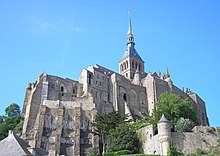 p 484 | Archangel Michael at the Abbey on the Mount (Abbey of Mont Saint-Michel).
p 484 | Archangel Michael at the Abbey on the Mount (Abbey of Mont Saint-Michel).p 484 | Offertory= the offering of bread and wine to God as part of the Communion ceremony during a Christian church service.
p 485 | Palestrinising= playing sacred music by Giovanni da Palestrina.

p 485 | Whist: English card game, played by 4 players in 2 partnerships.
p 486 | Célestine Galli-Marié (1840-1905), French mezzo-soprano who created the title role in the opera Carmen.
 |
| Charcot |
Jean-Martin Charcot (1825–93) was a French neurologist and professor of anatomical pathology. Known as the founder of modern neurology. As a teacher, Charcot famously influenced students such as Freud, William James, Alfred Binet & Bouchard.
p 488 | Dr. Gabriel Bouffe de Saint-Blaise, Parisian doctor (b. 1862); Dr. Maurice Edme Courtois-Suffit, French doctor (1861-1947) (Thanks to M. Patrice Louis at Le fou de Proust)
p 489 | Trional (sedative drug) introduced in 1888.
Sodom and Gomorrah IV pp 471-83
p 471 | Hugo von Tschudi (1851-1911), director of the Gallery in Berlin and, unlike the Emperor, a supporter of Impressionism, was forced eventually to resign.
p 471 | Eulenberg affair (1907-9): German royal homosexual scandal. Philip, Prince of Eulenburg and (1847-1921), politician, diplomat & confidant of the German Emperor, Wilhelm II, was charged with homosexuality in 1906. Sturrock says: "In the chronology in the novel, the affair is misplaced, since Charlus is alluding to it some five years before it occurred."
p 471 | the "mediatized" families appear in the 2nd section (Durchlaucht) of the Almanack de Gotha, while the 1st section is reserved for the genealogies of Europe's royal houses. The Durchlaucht families were recognized as being equal in birth to the royal families, and intermediate in rank between them and the merely princely families of the Almanack's 3rd section. (Sturrock note)
p 472 | Commercy (link has Proust reference)
p 477 | Monsieur (from Middle French mon sieur, literally "my lord") is an honorific title that was used to refer to or address the eldest living brother of the king in the French royal court. The pretensions of the Croy family are noted in Proust's major historical source, the Memoirs of the Duc de Saint-Simon. (Sturrock note)

p 477 | The Duchy of Aumale
p 477 | Passavant: roughly, "go forward" (from the verb passer (to pass) & avant (before, in front of). (Sturrock note)
p 478 | Prince of Savoy-Carignano; "Prince of Hanover" refers to the Elector of Hanover, who became King George I of England in 1714. (Sturrock note)
p 478 | "Maecenas atavis edite regibus!": a quotation from Horace, Odes, bk. I, meaning "Maecenas, descended from royal ancestors!" (Sturrock note) From Wikipedia: "His name has become a byword for a wealthy, generous and enlightened patron of the arts." Which is how Charlus makes that compliment to Mme Verdurin.
p 479 | ...Sonata for piano and violin: Sonata No. 1 for Violin and Piano, Opus 13, by Fauré, (listen here) first performed in 1875.
p 480 | César Franck (1822–90) was a Belgian composer, pianist, organist & music teacher who worked in Paris.
p 481 | Giacomo Meyerbeer (born Jacob Liebmann Beer, 1791–1864) was a German opera composer of Jewish birth who has been described as perhaps the most successful stage composer of the 19th century, with his grand opera style achieved by merging German orchestra style with Italian vocal tradition. (Wiki). Robert le diable was a Romantic opera of 1831, thus rather primitive musically compared with Debussy. (Sturrock)
p 481 | Domenico Scarlatti (1685-1757), known for his harpsichord music. (Sturrock)
p 482 | Ephemerids=mayflies
p 482 | Asnières & Bois-Colombes: suburbs of Paris
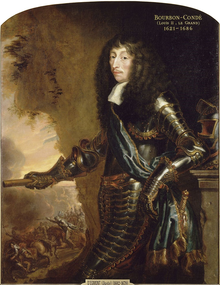
p 483 | Rosicrucian (Gestes esthétiques): fin-de-siècle aesthetic movement in France, comparable to the "deliquescent" movement in poetry referred to earlier (not referring to 17th century German illuminati) (Sturrock)
p 483 | etheromaniac= person addicted to using ether as a drug.
p 483 | The Great Condé: Louis II, Prince de Condé (1621-86), French general from the house of Bourbon. Leader of the so-called Fronde des Princes, or revolt against the regime of Cardinal Mazarin during Louis XIV's minority.
p 471 | Eulenberg affair (1907-9): German royal homosexual scandal. Philip, Prince of Eulenburg and (1847-1921), politician, diplomat & confidant of the German Emperor, Wilhelm II, was charged with homosexuality in 1906. Sturrock says: "In the chronology in the novel, the affair is misplaced, since Charlus is alluding to it some five years before it occurred."
p 471 | the "mediatized" families appear in the 2nd section (Durchlaucht) of the Almanack de Gotha, while the 1st section is reserved for the genealogies of Europe's royal houses. The Durchlaucht families were recognized as being equal in birth to the royal families, and intermediate in rank between them and the merely princely families of the Almanack's 3rd section. (Sturrock note)
p 472 | Commercy (link has Proust reference)
p 477 | Monsieur (from Middle French mon sieur, literally "my lord") is an honorific title that was used to refer to or address the eldest living brother of the king in the French royal court. The pretensions of the Croy family are noted in Proust's major historical source, the Memoirs of the Duc de Saint-Simon. (Sturrock note)

p 477 | The Duchy of Aumale
p 477 | Passavant: roughly, "go forward" (from the verb passer (to pass) & avant (before, in front of). (Sturrock note)
p 478 | Prince of Savoy-Carignano; "Prince of Hanover" refers to the Elector of Hanover, who became King George I of England in 1714. (Sturrock note)
p 478 | "Maecenas atavis edite regibus!": a quotation from Horace, Odes, bk. I, meaning "Maecenas, descended from royal ancestors!" (Sturrock note) From Wikipedia: "His name has become a byword for a wealthy, generous and enlightened patron of the arts." Which is how Charlus makes that compliment to Mme Verdurin.
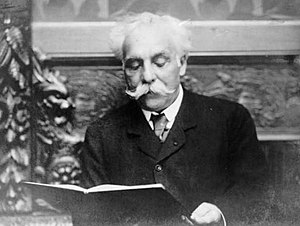 |
| Gabriel Fauré |
p 479 | ...Sonata for piano and violin: Sonata No. 1 for Violin and Piano, Opus 13, by Fauré, (listen here) first performed in 1875.
p 480 | César Franck (1822–90) was a Belgian composer, pianist, organist & music teacher who worked in Paris.
p 481 | Giacomo Meyerbeer (born Jacob Liebmann Beer, 1791–1864) was a German opera composer of Jewish birth who has been described as perhaps the most successful stage composer of the 19th century, with his grand opera style achieved by merging German orchestra style with Italian vocal tradition. (Wiki). Robert le diable was a Romantic opera of 1831, thus rather primitive musically compared with Debussy. (Sturrock)
p 481 | Domenico Scarlatti (1685-1757), known for his harpsichord music. (Sturrock)
p 482 | Ephemerids=mayflies
p 482 | Asnières & Bois-Colombes: suburbs of Paris

p 483 | Rosicrucian (Gestes esthétiques): fin-de-siècle aesthetic movement in France, comparable to the "deliquescent" movement in poetry referred to earlier (not referring to 17th century German illuminati) (Sturrock)
p 483 | etheromaniac= person addicted to using ether as a drug.
p 483 | The Great Condé: Louis II, Prince de Condé (1621-86), French general from the house of Bourbon. Leader of the so-called Fronde des Princes, or revolt against the regime of Cardinal Mazarin during Louis XIV's minority.
9.29.2015
Sodom and Gomorrah IV pp 456-70
p 456 | Banat; Louis d'Harcourt; Jean Anthelme Brillat-Savarin, 1755-1826): French lawyer and politician, who gained fame as an epicure and gastronome; sibylline = referring to certain women of antiquity reputed to possess powers of prophecy or divination; a female prophet or witch.
 p 457 | Piquet=an early 16th-century trick-taking card game for two players. The river Dives runs through Cabourg (Balbec), this is the church by the river, Notre Dame de Dives sur mer.
p 457 | Piquet=an early 16th-century trick-taking card game for two players. The river Dives runs through Cabourg (Balbec), this is the church by the river, Notre Dame de Dives sur mer.
p 459 | daubing: to coat or smear (a surface) with a thick or sticky substance in a carelessly rough way.
p 459 | Paul César Helleu (1859-1927): French oil painter, pastel artist, drypoint etcher, and designer, best known for numerous portraits of beautiful society women of the Belle Époque. He also conceived the ceiling mural of night sky constellations for Grand Central Terminal in NYC. Father of Jean Helleu, grandfather of Jacques Helleu, both artistic directors for Parfums Chanel.
p 460 | French strawberry mousse recipe.
p 463 | See a summary of these pages here, with comments.
p 466 | "a piece of green lustre plugging a broken pane...": a drop-shaped piece of cut glass or crystal used as a decoration on a chandelier, vase, etc. Or, a shiny metallic surface on some pottery and porcelain.
p 467 | Jouy hangings=toile de Jouy: cloth or canvas for painting on. draught-curtains are used to prevent heat loss from a room, due to drafts or weather.
p 468 | A misericord (sometimes named mercy seat) is a small wooden shelf on the underside of a folding seat in a church, installed to provide a degree of comfort for a person who has to stand during long periods of prayer. The small shelves were available for use at times when the folding chair was required to be stored folded up, and the person expected to be in an upright position.
p 468 | Agraphia: loss of the ability to write.
p 470 | "this Hohenzollern ... : with the abdication of Wilhelm II in 1918, the Hohenzollern dynasty of German emperors came to an end. The short-lived kingdom of Hanover was annexed by Prussia in 1866, and its last King was indeed dispossessed, but by Kaiser Wilhelm I, not his son. Prussia annexed Alsace-Lorraine from France following its victory in the 1870 war. (Sturrock)
 p 457 | Piquet=an early 16th-century trick-taking card game for two players. The river Dives runs through Cabourg (Balbec), this is the church by the river, Notre Dame de Dives sur mer.
p 457 | Piquet=an early 16th-century trick-taking card game for two players. The river Dives runs through Cabourg (Balbec), this is the church by the river, Notre Dame de Dives sur mer.p 459 | daubing: to coat or smear (a surface) with a thick or sticky substance in a carelessly rough way.
p 459 | Paul César Helleu (1859-1927): French oil painter, pastel artist, drypoint etcher, and designer, best known for numerous portraits of beautiful society women of the Belle Époque. He also conceived the ceiling mural of night sky constellations for Grand Central Terminal in NYC. Father of Jean Helleu, grandfather of Jacques Helleu, both artistic directors for Parfums Chanel.
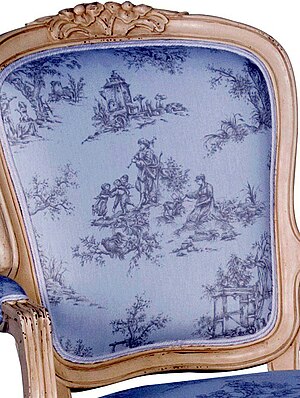 |
| Jouy |
p 460 | French strawberry mousse recipe.
p 463 | See a summary of these pages here, with comments.
p 466 | "a piece of green lustre plugging a broken pane...": a drop-shaped piece of cut glass or crystal used as a decoration on a chandelier, vase, etc. Or, a shiny metallic surface on some pottery and porcelain.
p 467 | Jouy hangings=toile de Jouy: cloth or canvas for painting on. draught-curtains are used to prevent heat loss from a room, due to drafts or weather.
p 468 | A misericord (sometimes named mercy seat) is a small wooden shelf on the underside of a folding seat in a church, installed to provide a degree of comfort for a person who has to stand during long periods of prayer. The small shelves were available for use at times when the folding chair was required to be stored folded up, and the person expected to be in an upright position.
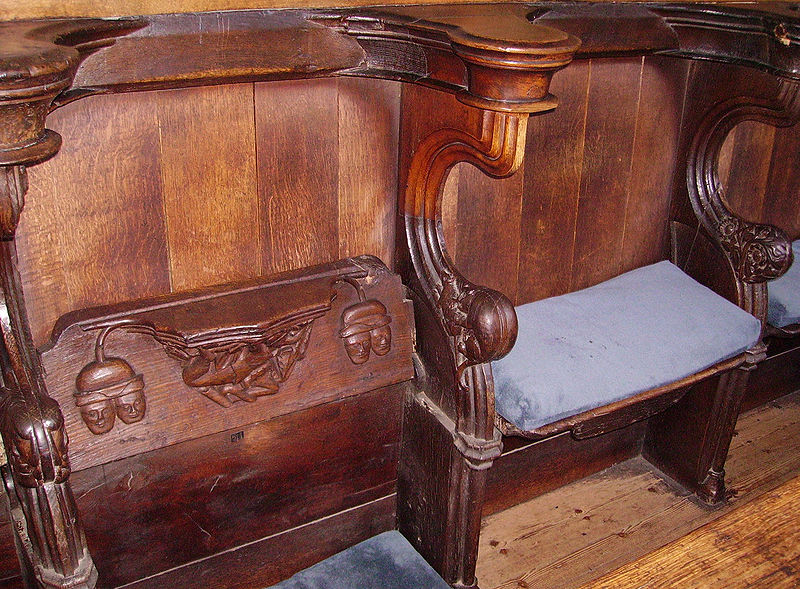 | ||
| "Boston Stump misericord 02" by Immanuel Giel (Own work). Public Domain via Commons License |
p 470 | "this Hohenzollern ... : with the abdication of Wilhelm II in 1918, the Hohenzollern dynasty of German emperors came to an end. The short-lived kingdom of Hanover was annexed by Prussia in 1866, and its last King was indeed dispossessed, but by Kaiser Wilhelm I, not his son. Prussia annexed Alsace-Lorraine from France following its victory in the 1870 war. (Sturrock)
9.16.2015
Sodom and Gomorrah IV pp 447-55
 p 447 | The English name "Normans" (settled in Normandy, France) comes from the French words Normans/Normanz, plural of Normant, modern French normand, which is itself borrowed from Old Low Franconian Nortmann "Northman" or directly from Old Norse Norðmaðr, Latinized as Nortmannus (recorded in Medieval Latin, 9th century) to mean "Norseman, Viking". (Wikipedia)
p 447 | The English name "Normans" (settled in Normandy, France) comes from the French words Normans/Normanz, plural of Normant, modern French normand, which is itself borrowed from Old Low Franconian Nortmann "Northman" or directly from Old Norse Norðmaðr, Latinized as Nortmannus (recorded in Medieval Latin, 9th century) to mean "Norseman, Viking". (Wikipedia) |
| Boutroux |
p 448 | Émile Boutroux (1845-1921) was an eminent 19th century French philosopher of science & religion and an historian of philosophy. He firmly opposed materialism in science. He ... defended the idea that religion & science are compatible... His work is overshadowed... by that of his student, the more celebrated Henri Bergson. He was elected to the Academy of Moral & Political Sciences in 1898 & to the Académie française in 1912. (Wiki)
 |
| Académie française |
p 448-9 | Henri Houssaye; Olivier Lefèvre d'Ormesson; Édouard René de Laboulaye: Honoré Le Peletier, comte d'Aunay; M. de Bussière; M. Albaret; M. de Cholet; M. dela Pommeraye
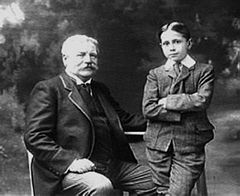 p 449 | Paul Porel (Paul Désire Parfouru, 1843-1917), actor & theater director, who ran the Odéon on the Left Bank, from 1884 to 1892, hence "Odéonia." He was married to the comedienne Réjane (one of the models for Berma), who, with their son Jacques Porel were friends with Proust.
p 449 | Paul Porel (Paul Désire Parfouru, 1843-1917), actor & theater director, who ran the Odéon on the Left Bank, from 1884 to 1892, hence "Odéonia." He was married to the comedienne Réjane (one of the models for Berma), who, with their son Jacques Porel were friends with Proust. p 449 | The Théâtre de l'Odéon is one of France's six national theatres. It is located at 2 rue Corneille in the 6th arrondissement of Paris on the left bank of the Seine, next to the Luxembourg Garden. It was originally built between 1779 and 1782, in the garden of the former Hôtel de Condé, to a Neoclassical design by Charles De Wailly and Marie-Joseph Peyre. The Odéon was originally intended to house the Comédie Française, which, however, preferred to stay at the Théâtre-Français in the Palais Royal. The new theatre was inaugurated by Marie-Antoinette on April 9, 1782.
p 450 | Even though Moncrieff uses "-ast" here, the French has "-arder", which Sturrock suggests could possibly stand for pétarder, meaning "to blow one's top" -- and possibly several other slangy meanings. I think Moncrieff used his translator's licence to indicate that the two men were gossiping about Charlus being gay (i.e., "pederast"). Remember Marcel has already indicated that the people in one's social circle wouldn't mention or notice it, but outsiders would do both.
p 452 | La Chercheuse d'esprit, a comic opera with words by Charles-Simon Favart (1710-92) and music by Jean-Claude Trial (1732-71), first presented in 1741.
p 453 | The Sarmatians were a large confederation of Iranian people during classical antiquity, flourishing from about the 5th century BC to the 4th century AD. They spoke Scythian, an Indo-European language from the Eastern Iranian family.
p 454 | ... the Rohans...: The House of Rohan is a French noble family of viscounts, later dukes and princes, coming from the locality of Rohan in Brittany.
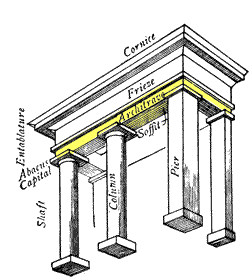 |
| architrave |
 |
| Odéon |
p 455 | Mme Jeanne Samary: 19th century actress and model (Renoir's lover for a while).
p 455 | Le Capitaine Fracasse by Théophile Gautier: This book was promised to the public in 1836 but finally published in 1863. It is centered on a soldier named Fracasse whose adventures portray bouts of chivalry, courage and a sense of adventure. Gautier places the story in his favourite historical era, that of Louis XIII. It is best described as a typical cloak-and-dagger fairy tale where everyone lives happily ever after.
Subscribe to:
Posts (Atom)




